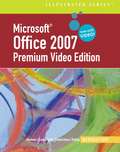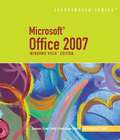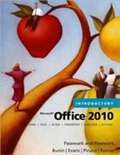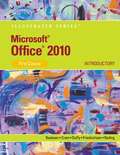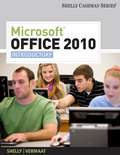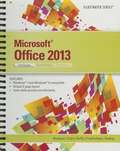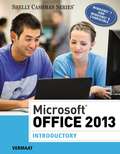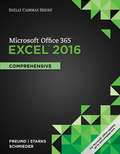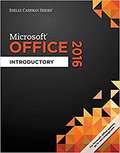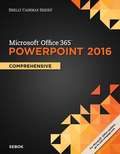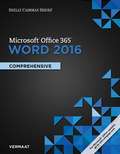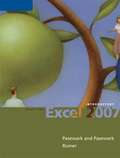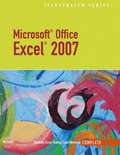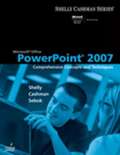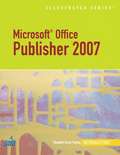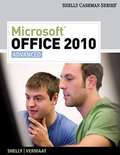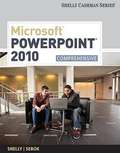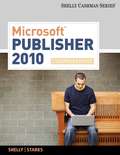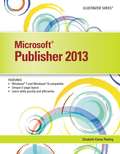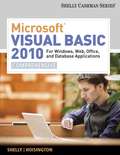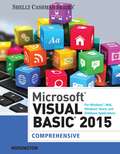- Table View
- List View
Microsoft® Office 2007: Illustrated, Premium Video Edition, Introductory
by David Beskeen Carol Cram Jennifer Duffy Lisa Friedrichsen Elizabeth Eisner RedingGive your students a comprehensive, hands-on, and engaging learning experience with the MICROSOFT OFFICE 2007-ILLUSTRATED INTRODUCTORY PREMIUM VIDEO EDITION. This Premium Video Edition includes a Video Companion containing approximately 150 videos each based on a two-page lesson in the book, 10 Capstone Projects and SAM Projects instruction files to help Bring Learning To Life For both the computer rookies and the computer hotshots û MICROSOFT OFFICE 2007-ILLUSTRATED INTRODUCTORY PREMIUM VIDEO EDITION appeals to all the learners, covering the essential information that users need to know now. Our signature two-page spread design has been updated and refreshed to take full advantage of the new features of the Office 2007 software. This practical, easy-to-navigate book provides readers with the essential knowledge they need to succeed in both the classroom and beyond.
Microsoft® Office 2007: Illustrated, Windows Vista Edition, Introductory
by David Beskeen Carol Cram Jennifer Duffy Lisa Friedrichsen Elizabeth Eisner RedingThis Microsoft Office 2007 Illustrated Series book covers the essential information that you need to know now for Microsoft Vista 2007. Our signature two-page spread design has been updated and refreshed to take full advantage of the new features of the Office 2007 software. This practical, easy to navigate book provides you with the essential knowledge you need to succeed at both work and beyond.
Microsoft® Office 2010, Introductory
by Beth Pasewark Wadsworth Carolyn Denny Pasewark Jan Pasewark Stogner Katherine T. Pinard Rachel Biheller Bunin Jessica Evans William R. Pasewark Sr. Robin M. Romer Scott G. Pasewark Jr.This Microsoft Office 2010 Introductory text, part of the Origins Series, includes features that make learning easy and enjoyable, yet challenging for learners. Students receive a wide range of learning experiences from activities with one or two commands to simulations and case studies that challenge and sharpen learners' problem-solving skills. This is a hardcover text.
Microsoft® Office 2010: Illustrated Introductory, First Course
by Carol Cram Jennifer Duffy Lisa Friedrichsen Elizabeth Eisner Reding David W. BeskeenLoved by students for its visual and flexible way to build computer skills, the Illustrated Series is ideal for learning Microsoft Office 2010 for both computer rookies and hotshots.
Microsoft® Office 2010: Introductory
by Gary B. Shelly Misty E. VermaatMicrosoft Office 2010: Introductory provides a project-based, step-by-step approach to teaching the Office 2010 applications.
Microsoft® Office 2013 Illustrated, First Course
by Reding Beskeen Cram Duffy FriedrichsenPraised by instructors for its concise, focused approach and user-friendly format, the Illustrated Series engages both computer rookies and hot shots in mastering Microsoft Office 2013 applications quickly and efficiently. Skills are accessible and easy-to-follow thanks to the Illustrated Series' hallmark 2-page layout, which allows students to see an entire task in one view. New Learning Outcomes outline the skills covered in each lesson, and larger full-color screens represent exactly what students should see on their own computers. Each unit begins with a brief overview of the principles of the lesson, and introduces a case study for further application.
Microsoft® Office 2013: Introductory
by Misty E. VermaatIntroduce your students to the latest that Microsoft Office has to offer with the new generation of Shelly Cashman Series books! For the past three decades, the Shelly Cashman Series has effectively introduced computer skills to millions of students. With Microsoft Office 2013, we're continuing our history of innovation by enhancing our proven pedagogy to reflect the learning styles of today's students. In this text you'll find features that are specifically designed to engage students, improve retention, and prepare them for future success. Our trademark step-by-step, screen-by-screen approach now encourages students to expand their understanding of Microsoft Office 2013 software through experimentation, critical thought, and personalization. With these enhancements and more, the Shelly Cashman Series continues to deliver the most effective educational materials for you and your students.
Microsoft® Office 365® & Office 2019, Introductory
by Steven M. Freund Sandra E. Cable Ellen F. MonkNIMAC-sourced textbook
Microsoft® Office 365™ & Access® 2016: Comprehensive (Shelly Cashman Series)
by Mary Z. Last Philip J. PrattIntroduce your students to the latest advancements that Microsoft® Access 2016 has to offer with MICROSOFT® OFFICE 365 & ACCESS 2016: COMPREHENSIVE -- the new edition in today’s generation of acclaimed Shelly Cashman Series® books. For more than three decades, the Shelly Cashman Series® has effectively introduced computer skills to millions. MICROSOFT® OFFICE 365 & ACCESS 2016: COMPREHENSIVE continues the Series’ strong history of innovation with a hallmark learning approach now enhanced to address the varied learning styles of today’s students. A trademark, step-by-step, screen-by-screen approach provides a thorough understanding of Microsoft® Access 2016 through experimentation, critical thought, and personalization. This new edition and accompanying resources deliver effective educational materials specifically designed to engage readers, improve retention, and prepare students for future success in working with all aspects of Microsoft® Access 2016.
Microsoft® Office 365™ & Excel® 2016, Comprehensive
by Joy L. Starks Steven M. Freund Eric J. SchmiederNIMAC-sourced textbook
Microsoft® Office 365™ Office 2016: Introductory
by Steven M. Freund Mary Z. Last Corinne L. HoisingtonNIMAC-sourced textbook
Microsoft® Office 365™ Office 2016: Introductory
by Steven M. Freund Mary Z. Last Corinne L. HoisingtonMicrosoft® Office 365™: Comprehensive, Loose-leaf Version
by Misty E. VermaatNIMAC-sourced textbook
Microsoft® Office Excel 2007: Introductory Course
by Beth Pasewark Wadsworth Carolyn Denny Pasewark Jan Pasewark Stogner Scott G. Pasewark William R. Pasewark Robin M. RomerIntroduce your students to Microsoft Office Excel 2007 with the books teachers know and trust from the award-winning authors, Pasewark and Pasewark along with contributing authors Rachel Biheller Bunin, Jessica Evans, Katherine T. Pinard, and Robin M. Romer. This text includes features that make learning easy and enjoyable, yet challenging for learners. Students will be engaged with activities that range from simulations to case studies that challenge and sharpen problem-solving skills.
Microsoft® Office Excel® 2007: Illustrated Complete
by Elizabeth Eisner Reding Lynn WermersThis Microsoft Office 2007 Illustrated Series book will appeal to all the learners in your classroom, from the computer rookies to the computer hotshots. It covers the essential information that students need to know about how to use Microsoft Excel 2007. Our signature two-page spread design has been updated and refreshed to take full advantage of the new features of the Office 2007 software. This practical, easy to navigate book provides you with the essential knowledge you need to succeed in both the classroom and beyond.
Microsoft® Office PowerPoint® 2007: Comprehensive Concepts and Techniques
by Gary B. Shelly Thomas J. Cashman Susan L. SebokIn Microsoft PowerPoint 2007: Comprehensive Concepts and Techniques you?ll find features that are specifically improve retention, and prepare readers for future success. Our trademark step-by-step, screen-by-screen approach now encourages users to expand their understanding of the PowerPoint 2007 software through experimentation, exploration, and planning ahead.
Microsoft® Office Publisher 2007: Illustrated, Introductory
by Elizabeth Eisner RedingThis Microsoft Office 2007 Illustrated Series book covers the essential information that you need to know now for Microsoft Publisher 2007. Our signature two-page spread design has been updated and refreshed to take full advantage of the new features of the Office 2007 software. This practical, easy to navigate book provides you with the essential knowledge you need to succeed at both work and beyond.
Microsoft® Office Word 2007: Introductory Course
by Beth Pasewark Wadsworth Carolyn Denny Pasewark Jan Pasewark Stogner Katherine T. Pinard Scott G. Pasewark William R. PasewarkIntroduce your students to Microsoft Office Word 2007 with the books teachers know and trust from the award-winning authors, Pasewark and Pasewark along with contributing authors Rachel Biheller Bunin, Jessica Evans, Katherine T. Pinard, and Robin M. Romer. This text includes features that make learning easy and enjoyable, yet challenging for learners. Students will be engaged with activities that range from simulations to case studies that challenge and sharpen problem-solving skills.
Microsoft® Office® 2010, Advanced
by Gary B. Shelly Misty E. VermaatMICROSOFT OFFICE 2010: ADVANCED provides a project-based, step-by-step approach to teaching the Office 2010 applications.
Microsoft® PowerPoint® 2010, Comprehensive
by Gary B. Shelly Susan L. SebokMicrosoft Office PowerPoint 2010: Comprehensive provides a project-based, step-by-step approach to successfully teach students Microsoft PowerPoint 2010 skills.
Microsoft® Publisher 2010, Comprehensive
by Gary B. Shelly Joy L. StarksMicrosoft Publisher 2010: Comprehensive provides a project-based, step-by-step approach to teaching Publisher 2010.
Microsoft® Publisher 2013: Illustrated
by Elizabeth Eisner RedingPraised by instructors for its concise, focused approach and user-friendly format, the Illustrated Series engages both computer rookies and hot shots in mastering Microsoft Publisher 2013 quickly and efficiently. Skills are accessible and easy-to-follow thanks to the Illustrated Series' hallmark 2-page layout, which allows students to see an entire task in one view. New Learning Outcomes outline the skills covered in each lesson, and larger full-color screens represent exactly what students should see on their own computers. Each unit begins with a brief overview of the principles of the lesson, and introduces a case study for further application.
Microsoft® Visual Basic 2010 for Windows, Web, Office, and Database Applications: Comprehensive
by Gary B. Shelly Corinne HoisingtonMICROSOFT VISUAL BASIC 2010: COMPREHENSIVE teaches students the essentials of computer programming using the latest Visual Basic programming language, Visual Basic 2010.
